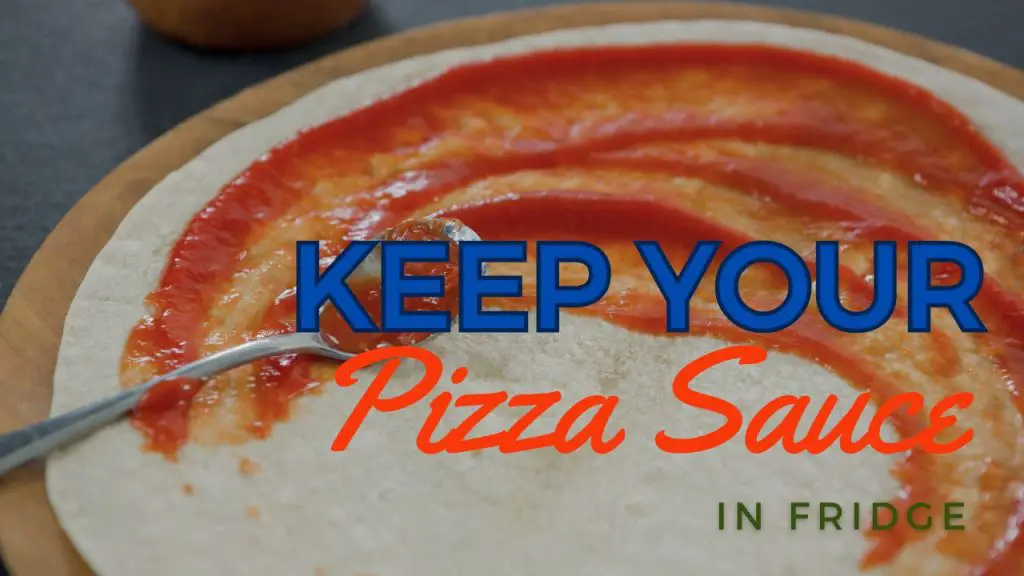How Long is Pizza Sauce Good for in the Fridge?
Pizza, a beloved and timeless comfort food, has made its way into our hearts and our refrigerators. But have you ever wondered just how long that leftover pizza can last in your fridge? In this informative article, we’ll delve into the science of food preservation, explore the shelf life of pizza, investigate the perishability of pizza sauce when not refrigerated, and equip you with the knowledge to determine if your pizza sauce has gone bad.
How Long is Pizza Sauce Good for in the Fridge?
While freezing is an excellent option for long-term storage, many people wonder about the shelf life of pizza sauce in the fridge. Pizza sauce can be stored in the refrigerator with certain considerations.
Typically, homemade pizza sauce or opened store-bought pizza sauce can last in the fridge for about 5 to 7 days. This is provided that it is stored in an airtight container to prevent exposure to air, which can lead to bacterial growth and spoilage.
To maximize the fridge life of your pizza sauce, always ensure that you use clean utensils when scooping it out and do not double-dip. The introduction of bacteria from contaminated utensils or residual food can significantly reduce the sauce’s longevity.
When inspecting your pizza sauce for freshness, look for any signs of mold, off-putting odors, or changes in texture. If you notice any of these indicators, it’s advisable to discard the sauce, as it may no longer be safe to consume.
If you anticipate that you won’t be able to consume your pizza sauce within the 5 to 7-day timeframe, consider freezing the remaining sauce as described in the previous section. This will help you preserve its quality for future use and minimize food waste.
Related; discover 5 different ideas on what to do with leftover pizza.
Does Pizza Sauce Go Bad If Not Refrigerated?
Pizza sauce, a crucial component of your pizza, can raise questions about its shelf life when left unrefrigerated. Pizza sauce primarily consists of tomatoes, herbs, and spices, which can contribute to its preservation. However, exposing it to room temperature for an extended period can lead to spoilage.
When pizza sauce is not refrigerated, it becomes more susceptible to bacterial growth and fermentation, which can lead to off-flavors and spoilage. In warmer environments, this process accelerates, shortening the sauce’s safe consumption window. To extend the life of your pizza sauce, always store it in the refrigerator, preferably in an airtight container. This simple step can help maintain its freshness for a more extended period.

How to Tell If Pizza Sauce Has Gone Bad
Recognizing the signs of spoiled pizza sauce is essential to avoid unpleasant foodborne illnesses. Here are some indicators that your pizza sauce may have gone bad:
Can You Freeze Pizza Sauce?
Freezing pizza sauce is a practical way to extend its shelf life and ensure that it remains usable for future culinary adventures. The answer to whether you can freeze pizza sauce is a resounding yes. However, there are specific guidelines and tips to keep in mind to ensure the best results.
When freezing pizza sauce, it’s crucial to use an airtight container or a vacuum-sealed bag to prevent freezer burn and maintain the sauce’s quality. Freezing pizza sauce in smaller portions can be advantageous, as it allows you to defrost only the amount you need for your next pizza night, reducing waste.
Related; Alternative Pizza sauces
Moreover, consider adding a small amount of olive oil to your pizza sauce before freezing. This will create a protective layer on top, further shielding it from freezer burn. Be sure to label the container with the freezing date for easy tracking.
The freezing process can extend the lifespan of pizza sauce significantly. When properly stored, frozen pizza sauce can remain in good condition for up to 3 to 6 months, depending on factors such as the sauce’s ingredients and the quality of your freezer. Keep in mind that while the sauce’s flavor and consistency may remain intact, prolonged storage can lead to some separation. A quick stir upon thawing should solve this issue.
Wrapping Up
Pizza, a delightful treat, can last a decent amount of time in your fridge if stored correctly. Remember to keep your refrigerator at a cool temperature, pay attention to the type of pizza, and use your senses to assess its freshness. Additionally, never leave pizza sauce unrefrigerated for too long, as it can spoil and lead to foodborne illnesses. By being mindful of these factors and knowing how to identify spoiled sauce, you can enjoy your pizza leftovers safely and deliciously.







